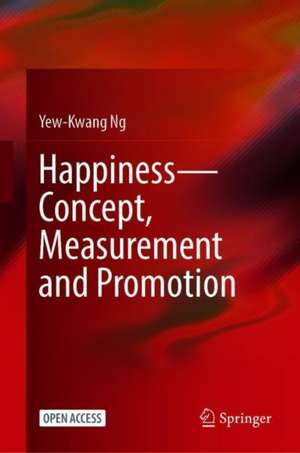Happiness—Concept, Measurement and Promotion
Autor Yew-Kwang Ngen Limba Engleză Hardback – 4 dec 2021
Preț: 228.74 lei
Nou
Puncte Express: 343
Preț estimativ în valută:
43.77€ • 45.64$ • 36.38£
43.77€ • 45.64$ • 36.38£
Carte disponibilă
Livrare economică 28 februarie-14 martie
Livrare express 13-19 februarie pentru 35.36 lei
Preluare comenzi: 021 569.72.76
Specificații
ISBN-13: 9789813349711
ISBN-10: 9813349719
Pagini: 258
Ilustrații: XV, 183 p. 5 illus., 2 illus. in color.
Dimensiuni: 155 x 235 x 18 mm
Greutate: 0.46 kg
Ediția:1st ed. 2022
Editura: Springer Nature Singapore
Colecția Springer
Locul publicării:Singapore, Singapore
ISBN-10: 9813349719
Pagini: 258
Ilustrații: XV, 183 p. 5 illus., 2 illus. in color.
Dimensiuni: 155 x 235 x 18 mm
Greutate: 0.46 kg
Ediția:1st ed. 2022
Editura: Springer Nature Singapore
Colecția Springer
Locul publicării:Singapore, Singapore
Cuprins
What is Happiness? Why is Happiness Important.- Happiness versus Preference.- Some Conceptual Mistakes about Happiness.- Happiness or Life Satisfaction.- Happiness as the Only Intrinsic Value.- The Measurement and Comparison of Happiness.
Notă biografică
Yew-Kwang Ng has been Special Chair Professor at the School of Economics, Fudan University, Shanghai, and is Emeritus Professor with Monash University. He is in the Advisory Board of the Global Priorities Institute at Oxford University and was invited to deliver the inaugural Atkinson Memorial Lecture in 2018 at Oxford University. He has received many awards including the top award (Distinguished Fellow) of the Economic Society of Australia in 2007.
Textul de pe ultima copertă
This open access book defines happiness intuitively and explores several common conceptual mistakes with regard to happiness. It then moves on to address topical issues including, but not limited to, whether money can buy you happiness, why happiness is ultimately the only thing of intrinsic value, and the various factors important for happiness. It also presents a more reliable and interpersonally comparable method for measuring happiness and discusses twelve factors, from A to L, that are crucial for individual happiness: attitude, balance, confidence, dignity, engagement, family/friends, gratitude, health, ideals, joyfulness, kindness and love. Further, it examines important public policy considerations, taking into account recent advances in economics, the environmental sciences, and happiness studies. Novel issues discussed include: an environmentally responsible happy nation index to supplement GDP, the East Asian happiness gap, a case for stimulating pleasure centres of the brain, and an argument for higher public spending.
Caracteristici
Provides an intuitive definition of happiness and explores several fallacies concerning happiness in a way understandable to the general public Combines interdisciplinary (economic, psychological, sociological, evolutionary biology, neuroscience) knowledge to promote happiness at the individual and social levels Discusses openly controversial issues like brain stimulation of pleasure centers and the East Asian happiness gap Is an open access book
